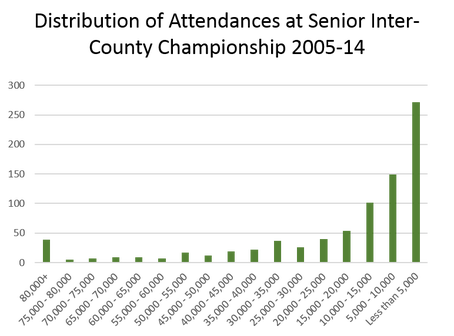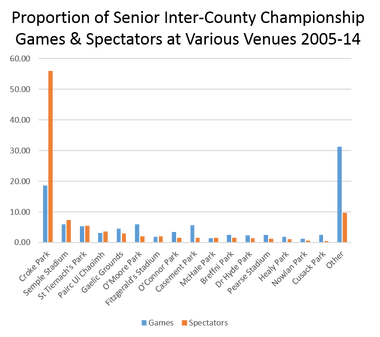The GAA approach to stadia got plenty of coverage in the Irish Examiner this week. Paul Rouse started the ball rolling (his recent book on Sport & Ireland is reviewed elsewhere on this blog). Rouse raised many questions about the proposed new "M50" stadia and the GAA's stadia policy in general (here). The following day, in the same newspaper, Brendan O'Brien returned to the issue (here). O'Brien noted how other stories, again in the Irish Examiner, pointed to the competing financial demands on county boards. One of these demands is the cost of preparing teams. At the top of the page where O'Brien's article appeared there was story explaining how Tipperary spent over €1m preparing their inter-county teams in 2015. Under Paul Rouse's piece the previous day, Jackie Cahill documented how Wexford spent over €800k preparing their teams. Earlier this month the Irish Examiner documented that the expenses in Limerick were also over €1m (here).
Remember the €1m per year, per county, figure is for teams composed of players that are not paid for playing. It is questionable whether or not the GAA could afford to go professional. However, there is more money being generated by the inter-county game than is being spent on expenses. Therefore, extra revenue tends to find its way into facilities (playing facilities and stadia capacity) in a similar way to the way that increases in Premier League TV broadcasting money tend to find its way into players (transfers and wages). When it comes to GAA stadia, the key feature tends to be capacity. One is unlikely to find a dining venue or a shop selling county merchandise. These activities tend to be left to the street traders.
Over a decade ago, Seamus Coffey and myself documented the demand for larger GAA stadia capacity (here). In the intervening period, this work has been regularly updated but the broad picture remains the same. There is a need for some larger stadia to accommodate All-Ireland and Provincial finals. But, the majority of games involve less than 20,000 spectators. This is illustrated in the figure below that presents 10 years of events (i.e. there could be more than one game played). Less than 50 events attracted 80,000+ over the ten years whereas there were over 250 games with 5,000 or fewer.
Then there are commercial difficulties. Take corporate boxes for example. At present, the GAA sells corporate box and premium level seating in Croke Park. These patrons are promised a certain number and type of games. There are only so many All-Ireland finals, semi-finals, and quarter-finals to go around. It would be doubtful if corporate boxes or premium level seating outside of Croke Park could provide a financial windfall. Brendan O'Brien drew attention to the quality of the press box facilities in Portlaoise.
It is over 12 years since Seamus Coffey and myself addressed the issue in our working paper. Our paper addressed issues raised in the GAA's Strategic Review. We proposed the (re)development of one major stadium in Connaght, Leinster, Munster, and Ulster. We were less convinced by the proposal to develop two new medium capacity stadia outside of Dublin. However, there may well be a case for one quality stadium on the "outskirts" of Dublin. The outskirts might stretch as far as Portlaoise, Newbridge, or Navan. Or it could be as close as the M50. The key is that it should be part of a wider investment strategy. But it is difficult to get away from the fact that, because of its financial model, the GAA is always likely to have too many larger stadia.


 RSS Feed
RSS Feed